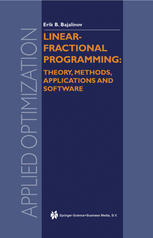

Most ebook files are in PDF format, so you can easily read them using various software such as Foxit Reader or directly on the Google Chrome browser.
Some ebook files are released by publishers in other formats such as .awz, .mobi, .epub, .fb2, etc. You may need to install specific software to read these formats on mobile/PC, such as Calibre.
Please read the tutorial at this link: https://ebookbell.com/faq
We offer FREE conversion to the popular formats you request; however, this may take some time. Therefore, right after payment, please email us, and we will try to provide the service as quickly as possible.
For some exceptional file formats or broken links (if any), please refrain from opening any disputes. Instead, email us first, and we will try to assist within a maximum of 6 hours.
EbookBell Team

4.8
104 reviewsThis is a book on Linear-Fractional Programming (here and in what follows we will refer to it as "LFP"). The field of LFP, largely developed by Hungarian mathematician B. Martos and his associates in the 1960's, is concerned with problems of op timization. LFP problems deal with determining the best possible allo cation of available resources to meet certain specifications. In particular, they may deal with situations where a number of resources, such as people, materials, machines, and land, are available and are to be combined to yield several products. In linear-fractional programming, the goal is to determine a per missible allocation of resources that will maximize or minimize some specific showing, such as profit gained per unit of cost, or cost of unit of product produced, etc. Strictly speaking, linear-fractional programming is a special case of the broader field of Mathematical Programming. LFP deals with that class of mathematical programming problems in which the relations among the variables are linear: the con straint relations (i.e. the restrictions) must be in linear form and the function to be optimized (i.e. the objective function) must be a ratio of two linear functions.